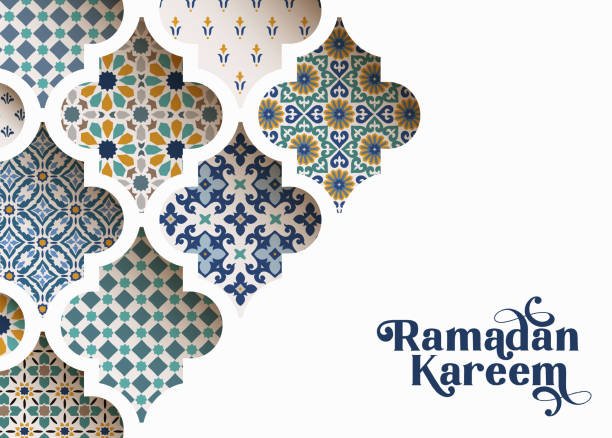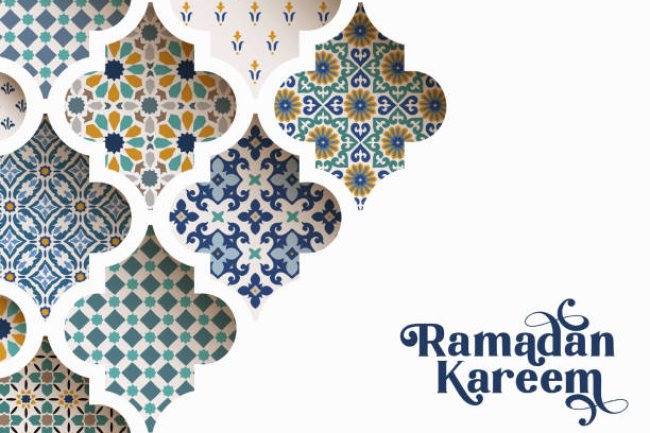Meritorious Acts During Ramadhan
The Night Prayer or Tarawih Prayers, Giving Charity And Donations, Increasing One s Recitation of The Quran, Seclusion in the Mosque (I-tikaf), Searching for the Night of Decree, Performing `Umrah During Ramadhan

The Night Prayer or Tarawih Prayers
Allah's Messenger (Peace be upon Him) has encouraged offering prayer at night regularly. This prayer is known as the 'night prayer' (Qiyamul-Layl) or (Tahajjud). During Ramadhan this prayer is also call Tarawih. It is allowed to offer the Tarawih, at any time starting from the conclusion of' Isha (Night) prayer until the commencement of the Fajr (Dawn) prayer. The Prophet (Peace be upon Him) always prayed eleven Rak'ahs (units of prayer) for the optional night prayer, whether it was during Ramadhan or any other time of the year but it is allowed to pray more than 11 Rakahs InshaAllah.
Narrated Ibn Umar: Once a person asked Allah's Apostle about the night prayer. Allah's Apostle replied, "The night prayer is offered as two Rakat followed by two Rakat and so on and if anyone is afraid of the approaching dawn (Fajr prayer) he should pray one Raka and this will be a Witr for all the Rakat which he has prayed before." (Bukhari Volume 2, Book 16, Number 105)
Two groups have gone to extremes with regard to this matter. The first group denounced everyone who prays more than eleven rak’ahs and said that doing so was bid’ah. The second group denounced those who do only eleven rak’ahs and said that they are going against scholarly consensus (ijmaa’).
Let us listen to what Shaykh Ibn ‘Uthaymeen (may Allaah have mercy on him) said:
Here we say that we should not go to extremes or be negligent. Some people go to extremes in adhering to the number mentioned in the Sunnah, and say that it is not permissible to do more than the number mentioned in the Sunnah, and they aggressively denounce those who do more than that, saying that they are sinners.
This is undoubtedly wrong. How can they be sinners, when the Prophet SAWS (peace and blessings of Allaah be upon him), upon being asked about night prayers, said that they are to be done two by two, and he did not specify any particular number? Of course the one who asked him about the night prayer did not know the number, because if he did not know how to do it, it is even more likely that he did not know the number. And he was not one of those who served the Prophet (peace and blessings of Allaah be upon him) so that we might say that he knew what happened inside his house. Since the Prophet (peace and blessings of Allaah be upon him) told him how to do it but did not say how many times, it may be understood that the matter is broad in scope, and that a person may pray one hundred rak’ahs then pray Witr with one rak’ah.
Tarawih, is a voluntary prayer by which a true believer intends to seek the pleasure of Allah and draw near to Him. The Prophet said (Peace be upon Him):
"Whoever performed the night prayer in Ramadhan with sincere faith and hoping for a reward from Allah, then all his past sins will be forgiven." (Al-Bukhari)
Al-Tirmidhi (806) narrated that Abu Dharr (may Allaah be pleased with him) said: The Messenger of Allaah (peace and blessings of Allaah be upon him) said: “Whoever prays qiyaam – i.e., Taraweeh – with the imam until he finishes, it will be recorded as if he spent the whole night in prayer.”
Classed as saheeh by al-Albaani in Saheeh al-Tirmidhi.
Giving Charity And Donations
One of the good deeds of this blessed month of Ramadhan is charity and benevolence, which is more virtuous than during the other months. The goal of giving charity and donations is to attain the pleasure of Allah(S.W.T).
“And whatever you spend in good, it will be repaid to you in full, and you shall not be wronged.” (Quran 2:272)
Narrated by Ibn Abbas, "The Prophet was the most generous amongst the people, and he used to be more so in the month of Ramadan when Gabriel visited him, and Gabriel used to meet him on every night of Ramadan till the end of the month. The Prophet used to recite the Holy Qur'an to Gabriel, and when Gabriel met him, he used to be more generous than a fast wind (which causes rain and welfare). (Bukhari)
Increasing One's Recitation of The Qur'an
The blessed month of Ramadhan is the month of the Qur'an, in which reciting the Qur'an according to one's ability is strongly recommended. The Messenger of Allah (Peace be upon Him) recited the Qur'an with the utmost concentration and deep contemplation of its meanings. For Ramadhan is the month in which the Qur'an was revealed. Allah (S.W.T) says interpretation of the meaning is: -
"The month of Ramadhan, in which the Qur'an was revealed; a guidance for mankind and clear proofs for the guidance and the criterion (between right and wrong)." (2:185)
Ramadan was the month in which the Qur’an was first revealed so it is the month of the Qur’an. We should devote much of this blessed month reciting the Qur’an.
Az-Zuhri Radi Allahu anhu used to say upon the coming of Ramadan, “It is only about reciting the Qur’an and feeding the poor.”
Abdur-Raziq Radi Allahu anhu said, “When Ramadan came, Sufyan Ath-Thawri would give up all acts of (voluntary) worship and devote himself to the recitation of the Qur’an.”
But for many of us the Qur’an has gathered a lot of dust since the last time we picked it up.
As Ramadan is fast approaching we must blow off the dust and start to build a close relationship with the Qur’an for it will intercede with us on the day of judgement:
“Recite the Holy Qur’an as much as we can for It will come as an intercessor for its reciter’ on the Day of Judgement” (Muslim
The Recitor will be in the company of Angels:
‘Aa’ishah Radi Allahu anha related that the Prophet (Sallallahu Alaihi Wasallam) said: “Indeed the one who recites the Quran beautifully, smoothly, and precisely, will be in the company of the noble and obedient angels. As for the one who recites with difficulty, stammering or stumbling through its verses, then he will have twice that reward.” (Bukhaari & Muslim)
There are Ten Rewards for Every Letter Recited from the Quran in normal times but in Ramadan these rewards are multiplied:
“Whoever reads a letter from the Book of Allaah, he will have a reward, and this reward will be multiplied by ten. I am not saying that ‘Alif, Laam, Meem’ (a combination of letters frequently mentioned in the Holy Quran) is a letter, rather I am saying that ‘Alif’ is a letter, ‘Laam’ is a letter and ‘Meem’ is a letter.” (At-Tirmithi)
Narrated by Ibn Abbas, "The Prophet was the most generous amongst the people, and he used to be more so in the month of Ramadan when Gabriel visited him, and Gabriel used to meet him on every night of Ramadan till the end of the month. The Prophet used to recite the Holy Qur'an to Gabriel, and when Gabriel met him, he used to be more generous than a fast wind (which causes rain and welfare). (Bukhari)
So what better time for us to get into the habit of reciting the Qur’an than to begin to do so right now. We should recite the Qur’an with its meanings and try to understand and implement it into our daily lives.
We should set ourselves realistic targets for how much we should begin to recite each day for e.g. we will recite some pages a day, half a juz (chapter), or 1 juz etc. We should recite however much we can manage and then build up gradually and aim to finish reciting the whole Qur'an at least once in the Month of Ramadhan
Everyone must endeavor to the best of his ability to fear Allah ~ with a conscious heart. In order to generate such a fearful mind, the best method is to recite the Noble Qur'an with due concentration, understanding, and contemplation of its meanings. Moreover, while reciting the Qur'an, he should reflect upon the supreme Omnipotence and absolute Majesty of Allah (S.W.T).
"Fear Allâh and Allâh teaches you". (2:282)
"And they fall down on their faces weeping and it increases their humility.'' (17:109)
"The believers are only those who, when Allah is mentioned, feel a fear in their hearts and when His Verses (this Qur'an) are recited unto them, they increase their Faith; and they put their trust in their Lord (Alone)." [Al-Anfaal (8):2]
Narrated Abu Huraira: The Prophet (salallahu alaihi wasallam) said, "The fire will not touch a man who weeps out of the fear of Allâh until the milk returns to the breasts. .............". (at-Tirmidhî (hasan sahîh), an-Nasâ'i and al Hâkim (sahîh))
Narrated Abu Huraira: The Prophet (salallahu alaihi wasallam) said, “Allah will give shade, to seven, on the Day when there will be no shade but His. (These seven persons are) a just ruler, a youth who has been brought up in the worship of Allah (i.e. worships Allah sincerely from childhood), a man whose heart is attached to the mosques (i.e. to pray the compulsory prayers in the mosque in congregation), two persons who love each other only for Allah’s sake and they meet and part in Allah’s cause only, a man who refuses the call of a charming woman of noble birth for illicit intercourse with her and says: I am afraid of Allah, a man who gives charitable gifts so secretly that his left hand does not know what his right hand has given (i.e. nobody knows how much he has given in charity), and a person who remembers Allah in seclusion and his eyes are then flooded with tears.” [Saheeh Al-Bukhari, Vol. No. 1, Hadeeth No. 629]
This Month should be used to get ourselves in that mould so that we can InshaAllah be Mindful of Allah through out the year and all our Lives.
Seclusion in the Mosque (I`tikaf)
One of the special deeds of Ramadhan is I`tikaf. Performing I`tikaf means to confine oneself in seclusion in a mosque for the purpose of worshipping Allah alone, leaving every worldly and personal affair. The mind of the person who observes I`tikaf concentrates exclusively on the goal of pleasing Allah (S.W.T). He is engaged in various types of worship, repentance, and beseeching Allah's forgiveness. He offers as many voluntarily prayers as he can, saying words of remembrance and invocations, etc. to Allah (S.W.T). In this sense, practicing I`tikaf is a combination of many acts of worship.
Narrated Abdullah bin Umar: Allah's Apostle used to practise Itikaf in the last ten days of the month of Ramadan. (Bukhari)
Narrated 'Aisha: (the wife of the Prophet) The Prophet used to practice Itikaf in the last ten days of Ramadan till he died and then his wives used to practice Itikaf after him. (Bukhari)
So Itikaf is also allowed for Sisters unlike what is believed now a days.
Searching for the Night of Decree
The Night of Decree (Laylatul-Qadr) is more virtuous and meritorious than one thousand months. It is the night of Ramadhan in which the Qur'an was brought from the highest heavens down to mankind. Allah ~ says in the Noble Qur'an interpretation of the meaning is: -
"Verily, We have sent it (this Qur'an) down in the Night of Decree (Al-Qadr). And what will make you know what the Night of Decree is? The Night of Decree is better than a thousand months." (97:1-3)
This night occurs every year during one of the five odd nights of the last ten days of Ramadhan. The exact time of its occurrence is unknown. The only thing that is clear concerning its time is that it occurs during the last ten nights of Ramadhan. Many scholars hold the view that it fluctuates from year to year between the odd nights of the last ten nights. This means that one year it may occur during the 21st night (for example) and the next year it may fall on the 27th night. One of the possible reasons behind its concealment is that a true believer should endeavor in worshipping Allah during those odd numbered nights so as to attain all the rich reward and virtue of that tremendous time.
Allah's Messenger (Peace be upon Him) has described its superiority and said: "Whoever prays during the Night of Decree, with firm belief and expecting a reward for it, his previous sins are forgiven." (Al-Bukhari and Muslim)
In other words, whenever you endeavor in worshipping in the odd nights of the last ten nights, then you will definitely attain the virtues of the Night of Decree.
Performing `Umrah During Ramadhan
Performing 'Umrah (lesser pilgrimage to Makkah) in Ramadhan is especially virtuous because it is equal in reward to Hajj (the major pilgrimage to Makkah).
The Prophet (Peace be upon Him) said:"Umrah in Ramadhan is equal (in reward) to Hajj -or he said "equal to (performing) Hajj with me." (Al-Bukhari and Muslim).
What's Your Reaction?



















